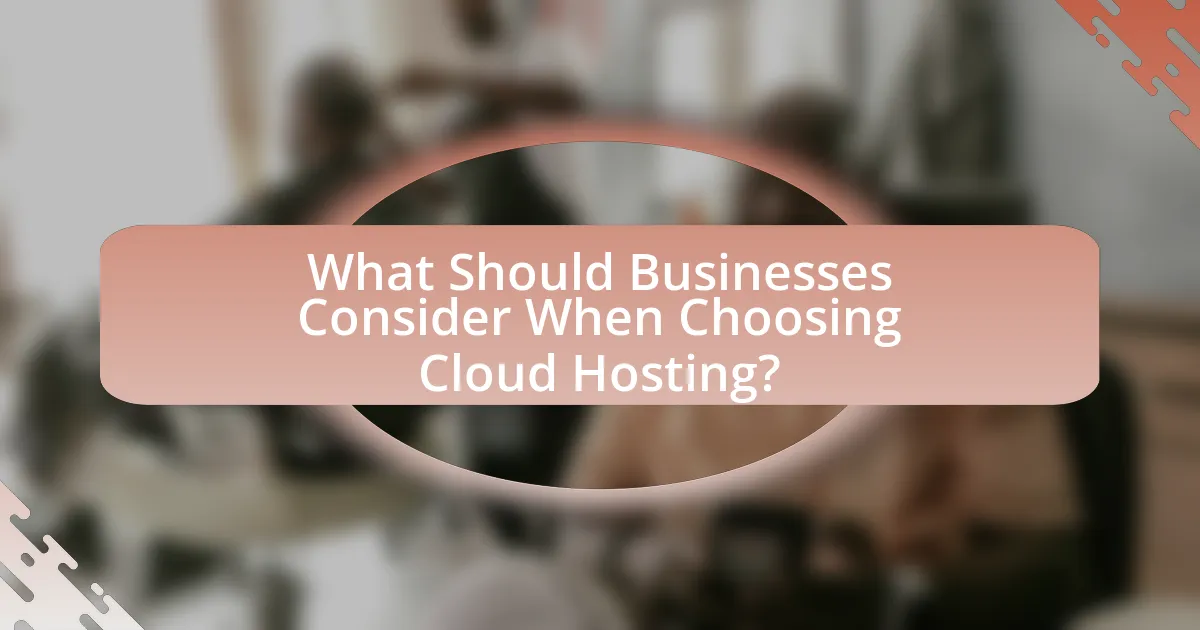The article addresses common misconceptions about cloud hosting, highlighting beliefs that it is less secure than on-premises solutions, only suitable for large enterprises, and guarantees automatic data backup. It explains that cloud hosting can provide robust security, scalability for businesses of all sizes, and requires active management for data backup. The origins of these misconceptions are explored, along with their impact on business decisions and operational efficiency. Additionally, the article debunks prevalent myths, discusses the differences between cloud and traditional hosting, and outlines best practices for businesses to optimize their cloud hosting experience.

What are the Common Misconceptions About Cloud Hosting?
Common misconceptions about cloud hosting include the belief that it is inherently less secure than on-premises solutions, that it is only suitable for large enterprises, and that it guarantees automatic data backup. In reality, cloud hosting can offer robust security measures, often surpassing those of traditional systems, as many providers invest heavily in security technologies and compliance certifications. Additionally, cloud hosting is scalable and accessible for businesses of all sizes, allowing small and medium enterprises to leverage its benefits. Lastly, while many cloud services offer backup solutions, users must actively configure and manage these features to ensure data is backed up properly, as reliance on the cloud alone does not guarantee data protection.
Why do people misunderstand cloud hosting?
People misunderstand cloud hosting primarily due to a lack of clarity about its fundamental concepts and functionalities. Many individuals equate cloud hosting solely with data storage, overlooking its broader capabilities, such as scalability, flexibility, and the ability to run applications remotely. Additionally, misconceptions arise from the technical jargon used in the industry, which can create confusion for non-technical users. According to a survey by RightScale, 94% of respondents reported that they faced challenges in understanding cloud services, highlighting the widespread nature of this misunderstanding.
What are the origins of these misconceptions?
The origins of misconceptions about cloud hosting stem from a combination of historical misunderstandings, marketing exaggerations, and a lack of technical knowledge among users. Early cloud services were often poorly defined, leading to confusion about their capabilities and security. For instance, the term “cloud” itself was abstract and vague, which allowed for varied interpretations. Additionally, marketing strategies frequently emphasized benefits without adequately addressing potential risks, contributing to unrealistic expectations. Research indicates that a significant portion of users still associate cloud hosting with traditional hosting models, failing to recognize the distinct differences in architecture and functionality. This gap in understanding perpetuates misconceptions, as users may not fully grasp how cloud solutions operate compared to on-premises systems.
How do these misconceptions affect businesses?
Misconceptions about cloud hosting negatively affect businesses by leading to poor decision-making and inefficient resource allocation. For instance, the belief that cloud hosting is inherently insecure can prevent companies from adopting beneficial cloud solutions, resulting in missed opportunities for cost savings and scalability. According to a report by Gartner, organizations that fail to embrace cloud technologies may incur up to 30% higher operational costs compared to those that effectively leverage cloud services. Additionally, misconceptions about cloud complexity can deter businesses from transitioning, causing them to remain reliant on outdated infrastructure, which can hinder innovation and competitiveness in the market.
What are the most prevalent myths surrounding cloud hosting?
The most prevalent myths surrounding cloud hosting include the beliefs that it is inherently insecure, excessively expensive, and that it leads to a loss of control over data. Many users assume that storing data off-site is less secure than on-premises solutions; however, cloud providers often implement advanced security measures, including encryption and compliance with industry standards, which can exceed those of traditional hosting. Additionally, while some perceive cloud hosting as costly, it can actually reduce overall IT expenses by eliminating the need for physical infrastructure and maintenance. Lastly, the notion that cloud hosting results in a loss of control is misleading; users can often manage their data and applications through user-friendly dashboards, maintaining significant oversight.
Is cloud hosting only for large enterprises?
Cloud hosting is not only for large enterprises; it is suitable for businesses of all sizes, including small and medium-sized enterprises. Many cloud hosting providers offer scalable solutions that cater to the specific needs of smaller organizations, allowing them to access advanced technology and resources without the need for significant upfront investment. According to a report by Gartner, the cloud services market is expected to grow significantly, indicating that businesses of all sizes are increasingly adopting cloud solutions to enhance their operations and reduce costs.
Does cloud hosting guarantee complete data security?
Cloud hosting does not guarantee complete data security. While cloud providers implement various security measures such as encryption, firewalls, and access controls, vulnerabilities can still exist due to human error, software flaws, or external attacks. According to a 2021 report by the Cloud Security Alliance, 64% of organizations experienced a cloud security incident, highlighting that reliance on cloud services does not eliminate risks. Therefore, users must adopt additional security practices to protect their data effectively.
Is cloud hosting more expensive than traditional hosting?
Cloud hosting can be more expensive than traditional hosting, but it often depends on the specific services and resources utilized. Traditional hosting typically involves fixed costs for dedicated server resources, while cloud hosting operates on a pay-as-you-go model, which can lead to higher costs if resource usage is not managed effectively. According to a report by Gartner, organizations can save up to 30% on IT costs by switching to cloud solutions, but this varies based on usage patterns and service providers.

How Can We Debunk These Misconceptions?
To debunk misconceptions about cloud hosting, one must provide clear, factual information that contrasts the myths with reality. For instance, a common misconception is that cloud hosting is less secure than traditional hosting; however, studies show that cloud providers often implement advanced security measures, including encryption and regular security audits, which can exceed those of on-premises solutions. According to a report by Gartner, 95% of cloud security failures are the customer’s fault, indicating that the cloud itself is not inherently insecure. By presenting such evidence and clarifying the facts, misconceptions can be effectively addressed and corrected.
What evidence supports the truth about cloud hosting?
Cloud hosting is supported by evidence demonstrating its scalability, cost-effectiveness, and reliability. Studies show that businesses utilizing cloud hosting can scale resources up or down based on demand, which is evidenced by a report from Gartner indicating that 70% of organizations plan to increase their cloud spending due to its flexibility. Additionally, a survey by Flexera found that 94% of enterprises reported improvements in security after migrating to cloud services, highlighting the reliability of cloud hosting solutions. Furthermore, the total cost of ownership for cloud hosting is often lower than traditional hosting, as indicated by a study from the International Data Corporation, which found that companies can save up to 30% on IT costs by adopting cloud solutions.
How do real-world examples clarify cloud hosting benefits?
Real-world examples clarify cloud hosting benefits by demonstrating tangible outcomes that organizations experience when adopting this technology. For instance, Netflix transitioned to cloud hosting to enhance its streaming capabilities, resulting in a 50% reduction in operational costs and improved scalability to handle millions of concurrent users. Similarly, Dropbox utilized cloud hosting to streamline file storage and sharing, leading to a user base growth from 100 million to over 500 million in just a few years. These examples illustrate how cloud hosting not only reduces costs but also enhances performance and scalability, effectively debunking misconceptions about its limitations.
What statistics counter common myths about cloud hosting?
Statistics show that 94% of businesses experience improved security after moving to the cloud, countering the myth that cloud hosting is less secure than on-premises solutions. Additionally, a report by Gartner indicates that 70% of organizations cite cost savings as a primary benefit of cloud adoption, challenging the belief that cloud hosting is more expensive. Furthermore, according to a study by Flexera, 83% of enterprise workloads are expected to be in the cloud by 2020, disproving the notion that cloud hosting is not widely adopted. These statistics highlight the advantages of cloud hosting and debunk prevalent misconceptions.
What are the key differences between cloud hosting and traditional hosting?
Cloud hosting utilizes a network of virtual servers to host websites, while traditional hosting relies on a single physical server. This fundamental difference allows cloud hosting to offer greater scalability, as resources can be adjusted dynamically based on demand, whereas traditional hosting typically requires manual upgrades to accommodate increased traffic. Additionally, cloud hosting provides enhanced reliability through redundancy, as data is distributed across multiple servers, reducing the risk of downtime, while traditional hosting is more vulnerable to outages if the single server fails.
How does scalability differ between cloud and traditional hosting?
Scalability in cloud hosting is dynamic and elastic, allowing resources to be adjusted in real-time based on demand, while traditional hosting typically requires manual intervention to scale, often involving hardware upgrades or additional server purchases. Cloud hosting utilizes a distributed architecture, enabling seamless scaling across multiple servers, which can accommodate sudden traffic spikes efficiently. In contrast, traditional hosting relies on fixed resources, making it less adaptable and potentially leading to downtime during peak usage periods. This difference is evidenced by the fact that cloud providers like Amazon Web Services and Microsoft Azure can automatically allocate resources within seconds, whereas traditional hosting setups may take hours or days to implement changes.
What are the cost implications of choosing cloud over traditional hosting?
Choosing cloud hosting typically results in lower upfront costs compared to traditional hosting, as cloud services operate on a pay-as-you-go model, eliminating the need for significant capital investment in hardware. Traditional hosting often requires purchasing and maintaining physical servers, which incurs costs for equipment, power, cooling, and physical space. In contrast, cloud hosting allows businesses to scale resources up or down based on demand, leading to potential savings during periods of low usage. According to a report by Gartner, organizations can save up to 30% on IT costs by migrating to cloud services due to reduced maintenance and operational expenses.

What Should Businesses Consider When Choosing Cloud Hosting?
Businesses should consider scalability, security, compliance, performance, and cost when choosing cloud hosting. Scalability ensures that resources can grow with business needs, allowing for flexibility in operations. Security is critical, as businesses must protect sensitive data; thus, evaluating the provider’s security measures is essential. Compliance with industry regulations, such as GDPR or HIPAA, is necessary to avoid legal issues. Performance, including uptime guarantees and speed, directly impacts user experience and operational efficiency. Lastly, understanding the total cost of ownership, including hidden fees and pricing models, helps businesses make informed financial decisions. These factors collectively ensure that the chosen cloud hosting solution aligns with business objectives and operational requirements.
How can businesses assess their cloud hosting needs?
Businesses can assess their cloud hosting needs by evaluating their current and future workload requirements, including data storage, processing power, and application performance. This assessment involves analyzing existing infrastructure, understanding user demands, and forecasting growth to determine the necessary resources. For instance, a study by Gartner indicates that 70% of organizations plan to increase their cloud spending, highlighting the importance of aligning cloud capabilities with business objectives. Additionally, businesses should consider factors such as security, compliance, and budget constraints to ensure that their cloud hosting solution meets both operational and strategic goals.
What factors should influence the choice of cloud hosting provider?
The choice of a cloud hosting provider should be influenced by factors such as reliability, scalability, security, support, and pricing. Reliability is crucial as it ensures minimal downtime; for instance, providers like Amazon Web Services report uptime of 99.99%. Scalability allows businesses to adjust resources based on demand, which is essential for growth. Security measures, including data encryption and compliance with regulations like GDPR, protect sensitive information. Quality support, available 24/7, is vital for resolving issues quickly, while competitive pricing models can significantly impact overall costs. These factors collectively determine the effectiveness and suitability of a cloud hosting provider for specific business needs.
How can businesses ensure they are not misled by cloud hosting myths?
Businesses can ensure they are not misled by cloud hosting myths by conducting thorough research and relying on credible sources for information. Engaging with reputable cloud service providers and industry experts can clarify misconceptions, as these entities often provide accurate data and case studies that debunk common myths. For instance, a study by Gartner indicates that 70% of organizations misunderstand the cost implications of cloud services, highlighting the importance of understanding pricing models directly from providers. Additionally, participating in webinars and industry forums can expose businesses to real-world experiences and insights, further mitigating the risk of being misled.
What best practices should businesses follow for effective cloud hosting?
Businesses should follow best practices such as selecting the right cloud service model, ensuring data security, optimizing resource management, and implementing regular backups for effective cloud hosting. Choosing between Infrastructure as a Service (IaaS), Platform as a Service (PaaS), or Software as a Service (SaaS) allows businesses to align their needs with the appropriate model, enhancing efficiency. Data security measures, including encryption and access controls, protect sensitive information, which is critical as data breaches can cost companies an average of $3.86 million according to IBM’s Cost of a Data Breach Report 2020. Optimizing resource management through auto-scaling and monitoring tools ensures that businesses only pay for what they use, reducing costs. Regular backups safeguard against data loss, with 93% of companies that lost their data center for 10 days or more due to a disaster filing for bankruptcy within a year, as reported by the National Archives & Records Administration.
How can businesses optimize their cloud hosting experience?
Businesses can optimize their cloud hosting experience by implementing a multi-cloud strategy, which allows them to leverage the strengths of different cloud providers. This approach enhances flexibility, reduces vendor lock-in, and can lead to cost savings by enabling businesses to choose the most cost-effective services for their needs. According to a report by Gartner, organizations that adopt a multi-cloud strategy can reduce their cloud spending by up to 30% while improving performance and reliability. Additionally, businesses should regularly monitor their cloud usage and performance metrics to identify inefficiencies and optimize resource allocation, ensuring they only pay for what they use.
What common troubleshooting tips can help with cloud hosting issues?
Common troubleshooting tips for cloud hosting issues include checking server status, verifying network connectivity, reviewing resource allocation, and examining application logs. Checking server status ensures that the cloud service is operational, as outages can occur; for instance, major providers like AWS and Azure have status pages that report real-time service health. Verifying network connectivity involves testing internet access and ensuring that firewalls or security groups are not blocking necessary ports. Reviewing resource allocation helps identify if the cloud instance has sufficient CPU, memory, and storage, as resource exhaustion can lead to performance degradation. Lastly, examining application logs provides insights into errors or issues that may be affecting the application’s performance, allowing for targeted fixes.


